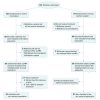Rivaroxaban vs Warfarin Sodium in the Ultra-Early Period After Atrial Fibrillation-Related Mild Ischemic Stroke: A Randomized Clinical Trial
- PMID: 28892526
- PMCID: PMC5710243
- DOI: 10.1001/jamaneurol.2017.2161
Rivaroxaban vs Warfarin Sodium in the Ultra-Early Period After Atrial Fibrillation-Related Mild Ischemic Stroke: A Randomized Clinical Trial
Abstract
Importance: In atrial fibrillation (AF)-related acute ischemic stroke, the optimal oral anticoagulation strategy remains unclear.
Objective: To test whether rivaroxaban or warfarin sodium is safer and more effective for preventing early recurrent stroke in patients with AF-related acute ischemic stroke.
Design, setting, and participants: A randomized, multicenter, open-label, blinded end point evaluation, comparative phase 2 trial was conducted from April 28, 2014, to December 7, 2015, at 14 academic medical centers in South Korea among patients with mild AF-related stroke within the previous 5 days who were deemed suitable for early anticoagulation. Analysis was performed on a modified intent-to-treat basis.
Interventions: Participants were randomized 1:1 to receive rivaroxaban, 10 mg/d for 5 days followed by 15 or 20 mg/d, or warfarin with a target international normalized ratio of 2.0-3.0, for 4 weeks.
Main outcomes and measures: The primary end point was the composite of new ischemic lesion or new intracranial hemorrhage seen on results of magnetic resonance imaging at 4 weeks. Primary analysis was performed in patients who received at least 1 dose of study medications and completed follow-up magnetic resonance imaging. Key secondary end points were individual components of the primary end point and hospitalization length.
Results: Of 195 patients randomized, 183 individuals (76 women and 107 men; mean [SD] age, 70.4 [10.4] years) completed magnetic resonance imaging follow-up and were included in the primary end point analysis. The rivaroxaban group (n = 95) and warfarin group (n = 88) showed no differences in the primary end point (47 [49.5%] vs 48 [54.5%]; relative risk, 0.91; 95% CI, 0.69-1.20; P = .49) or its individual components (new ischemic lesion: 28 [29.5%] vs 31 of 87 [35.6%]; relative risk, 0.83; 95% CI, 0.54-1.26; P = .38; new intracranial hemorrhage: 30 [31.6%] vs 25 of 87 [28.7%]; relative risk, 1.10; 95% CI, 0.70-1.71; P = .68). Each group had 1 clinical ischemic stroke, and all new intracranial hemorrhages were asymptomatic hemorrhagic transformations. Hospitalization length was reduced with rivaroxaban compared with warfarin (median, 4.0 days [interquartile range, 2.0-6.0 days] vs 6.0 days [interquartile range, 4.0-8.0]; P < .001).
Conclusions and relevance: In mild AF-related acute ischemic stroke, rivaroxaban and warfarin had comparable safety and efficacy.
Trial registration: clinicaltrials.gov Identifier: NCT02042534.
Conflict of interest statement
Figures
Comment in
-
Anticoagulation Timing for Atrial Fibrillation in Acute Ischemic Stroke: Time to Reopen Pandora's Box?JAMA Neurol. 2017 Oct 1;74(10):1174-1175. doi: 10.1001/jamaneurol.2017.1919. JAMA Neurol. 2017. PMID: 28892535 No abstract available.
References
-
- Paciaroni M, Agnelli G, Micheli S, Caso V. Efficacy and safety of anticoagulant treatment in acute cardioembolic stroke: a meta-analysis of randomized controlled trials. Stroke. 2007;38(2):423-430. - PubMed
-
- Sandercock P, Collins R, Counsell C, et al. ; International Stroke Trial Collaborative Group . The International Stroke Trial (IST): a randomised trial of aspirin, subcutaneous heparin, both, or neither among 19435 patients with acute ischaemic stroke. Lancet. 1997;349(9065):1569-1581. - PubMed
-
- CAST (Chinese Acute Stroke Trial) Collaborative Group CAST: randomised placebo-controlled trial of early aspirin use in 20,000 patients with acute ischaemic stroke. Lancet. 1997;349(9066):1641-1649. - PubMed
-
- Berge E, Abdelnoor M, Nakstad PH, Sandset PM. Low molecular-weight heparin versus aspirin in patients with acute ischaemic stroke and atrial fibrillation: a double-blind randomised study: HAEST Study Group: Heparin in Acute Embolic Stroke Trial. Lancet. 2000;355(9211):1205-1210. - PubMed
-
- Hart RG, Palacio S, Pearce LA. Atrial fibrillation, stroke, and acute antithrombotic therapy: analysis of randomized clinical trials. Stroke. 2002;33(11):2722-2727. - PubMed
Publication types
MeSH terms
Substances
Associated data
LinkOut - more resources
Full Text Sources
Other Literature Sources
Medical
Miscellaneous


